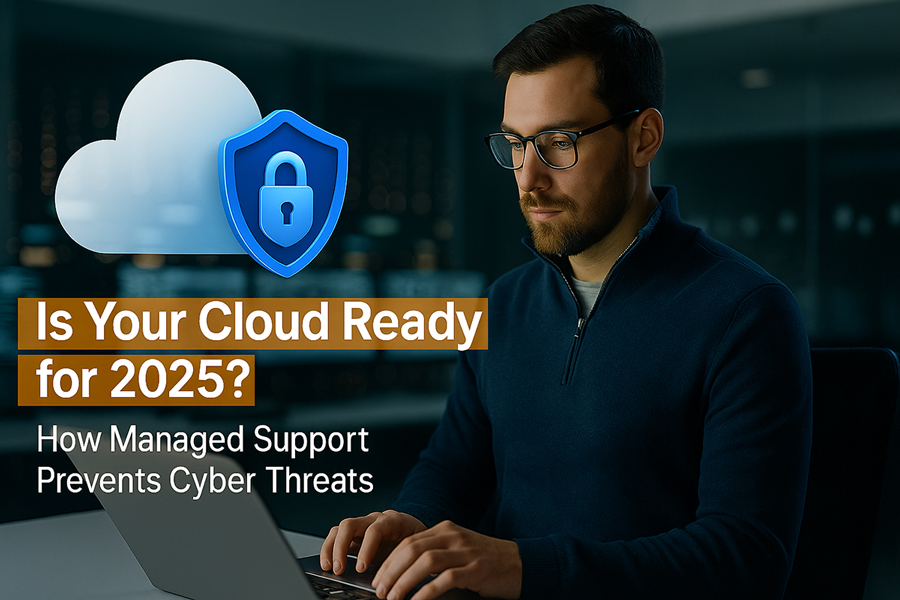 The modern cloud landscape has transformed the way businesses operate. From startups to global enterprises, every organization relies on cloud applications and infrastructure for storage, collaboration, analytics, and scalability.
The modern cloud landscape has transformed the way businesses operate. From startups to global enterprises, every organization relies on cloud applications and infrastructure for storage, collaboration, analytics, and scalability.
But with this digital shift, cybersecurity threats have grown faster than ever. Companies are now facing challenges such as data breaches, identity theft, and ransomware attacks, putting customer trust and business continuity at serious risk.
Businesses that once viewed the cloud as an easy way to scale are realizing that cloud security is not just about firewalls or encryption it’s about continuous monitoring, compliance, and expert intervention.
This is exactly where managed support becomes the most reliable defense.
Understanding the Cloud Security Challenges
Cloud environments are dynamic new applications, APIs, and user accounts are added every day. Without proper monitoring, this creates blind spots where attackers hide.
Some of the top challenges businesses face include:
Misconfiguration and Human Error
One of the leading causes of cloud breaches is simple misconfiguration. An open storage bucket, weak password policy, or unprotected API can expose entire datasets to hackers.
Cloud providers offer built-in security tools, but configuring them correctly requires experience and constant updates.
Managed support teams continuously audit these configurations, ensuring that no system, server, or database is left vulnerable.
Identity and Access Control Issues
With hybrid work and remote access, controlling who can enter your cloud systems is difficult. Many attacks today start with stolen credentials or excessive user privileges.
Without proper Identity and Access Management (IAM), one compromised account can open the door to the entire infrastructure.
Managed security experts enforce strong password policies, enable multi-factor authentication, and review access logs to keep unwanted users out.
API and SaaS Vulnerabilities
APIs connect applications and services, but poorly secured ones can leak sensitive data. Similarly, SaaS applications often come with default settings that need to be hardened.
Businesses that depend on SaaS tools for daily operations especially those running enterprise SaaS should consider partnering with providers offering front line support for enterprise SaaS.
This ensures that both customer-facing and backend systems remain protected from intrusion.
Compliance and Data Privacy
Every region now has its own data protection law from GDPR in Europe to DPDP in India. Companies handling customer information must ensure that cloud data storage and processing comply with these regulations.
A single compliance failure can lead to massive penalties and loss of customer trust.
Managed support providers help maintain audit trails, conduct periodic compliance checks, and automate reporting saving time, money, and reputation.
Multi-Cloud and Hybrid Complexity
Many organizations are using a mix of public and private clouds for flexibility, but this creates multiple security layers to manage.
Visibility becomes a challenge when data moves across platforms like AWS, Azure, and Google Cloud.
Managed cloud support brings unified visibility integrating logs, monitoring endpoints, and maintaining a central dashboard for all security alerts.
This ensures no threat goes unnoticed, even in complex setups.
How Managed Support Keeps Your Cloud Safe
Managed support isn’t just about fixing issues when they occur it’s about preventing them before they happen. Businesses that invest in expert support enjoy round-the-clock monitoring, quick response to incidents, and proactive optimization of cloud environments.
24×7 Monitoring and Incident Response
Managed teams monitor your infrastructure all day, every day. Using AI-based tools, they detect suspicious activities like unusual login patterns or data transfers.
When an anomaly appears, response teams isolate the threat immediately, investigate the root cause, and restore systems without downtime.
This real-time protection is what makes managed support vital for any enterprise running critical workloads in the cloud.
Zero Trust and Secure Architecture:
Modern managed support partners implement Zero Trust Security Architecture, ensuring that no user or device is trusted by default. Every request is verified, authenticated, and logged.
This approach protects businesses from insider threats, compromised credentials, and malware propagation.
It also helps organizations align with leading frameworks like ISO 27001 and NIST.
Cost-Effective and Scalable:
Hiring in-house experts for every security layer is expensive and difficult. Managed support services offer a cost-effective solution a team of skilled engineers, security analysts, and compliance officers who already understand cloud ecosystems.
They help scale protection as your business grows, without increasing operational costs.
Cloud Backup and Disaster Recovery:
Accidents happen a deleted database, a power failure, or even a ransomware attack. Managed support services include backup and disaster recovery (BDR) plans designed to restore operations instantly.By maintaining offsite and encrypted backups, these services guarantee that business data remains safe and recoverable anytime.
Proactive Patching and Automation:
Unpatched software remains one of the biggest vulnerabilities in cloud environments. Managed support ensures all your operating systems, plugins, and third-party apps are updated with the latest security patches. Through automation tools, these updates run seamlessly without affecting uptime or performance.
Secure Your Cloud for 2025 and Beyond
Ensure your cloud environment is protected against evolving cyber threats with expert managed support. Let actsupport assess your readiness and provide a tailored security strategy.
Building a Secure Future with Managed Support:
Cloud security isn’t a one-time project it’s an ongoing process. Attackers evolve, regulations change, and businesses expand.
What worked yesterday might not protect you tomorrow.
That’s why organizations across industries from fintech to healthcare, eCommerce to SaaS – are turning to managed support services.
With a dedicated partner handling monitoring, patching, and compliance, internal teams can focus on innovation instead of constant firefighting.
When you combine AI-powered detection, Zero Trust frameworks, and expert 24×7 support, your business builds true cloud resilience not just protection on paper.
If your company relies on cloud infrastructure and you want to stay secure, compliant, and future-ready, managed support is no longer optional it’s essential.




